Recent Posts
Rainstorm Damages Your Edmund Home
4/8/2024 (Permalink)
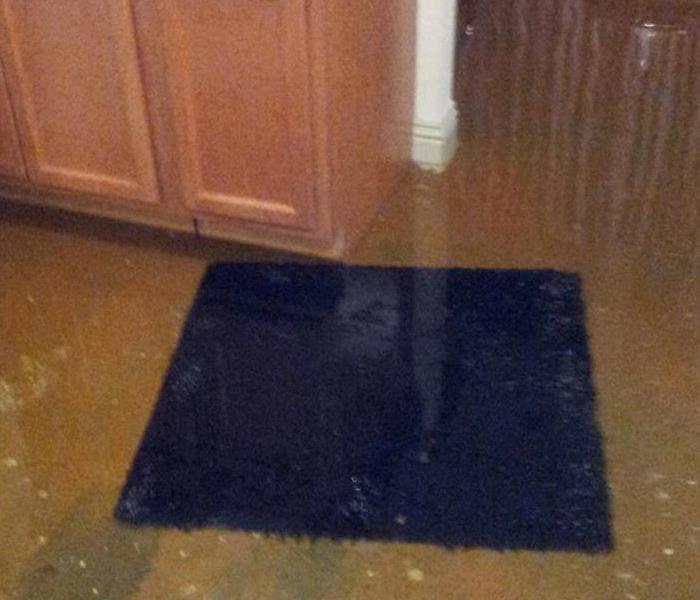 This flooded kitchen was caused by a torrential rainstorm
This flooded kitchen was caused by a torrential rainstorm
Storms can impact your Edmund home in several ways. Hurricanes or torrential rainstorms can cause flooding. Standing or rising water inside your Edmund home can cause significant damage. SERVPRO® of Edmund and Midwest City is the right restoration company to quickly remove the water, dry your home, and repair the flood damage.
When flood water enters your home, it can impact almost every surface. Drywall and wood can become swollen with water. Fabrics and upholstery may become stained and moldy. These are just a few of the ways that water can impact your home. All water damaged materials will need to be dried or removed before the repair work can begin. Some items may be salvaged, but others will need to be replaced. The best results will be from a restoration company that is focused on restoring the property to its preloss condition.
You want a certified restoration company to perform the repairs after a storm. Companies that are active with the Edmund Chamber of Commerce. Companies that are certified by the Institute of Inspection, Cleaning, and Restoration Certification. SERVPRO of Edmund and Midwest City is active in both of these organizations. Additionally, act quickly to schedule service.
When you contact a restoration company, ask about availability. The company ideally will offer around-the-clock service. You have a short amount of time to dry your home before the potential risk for mold. A timely response is imperative. In addition, inquire about the steps the company will take to follow through on the work. Ask about what the finished results look like. Finally, what is the expected time frame for the project. Flood damage repair can be significant, and the process may be lengthy.
SERVPRO of Edmund and Midwest City should be your first choice for any residential or commercial fire damage. Our team of professionals is trained to assess the damage, identify potential threats, and respond quickly to restore your property to preloss condition. SERVPRO of Edmund and Midwest City is available 24/7 by calling 405-330-2095
Use SERVPRO® to Board Up Your Commercial Property After a Fire
4/3/2024 (Permalink)
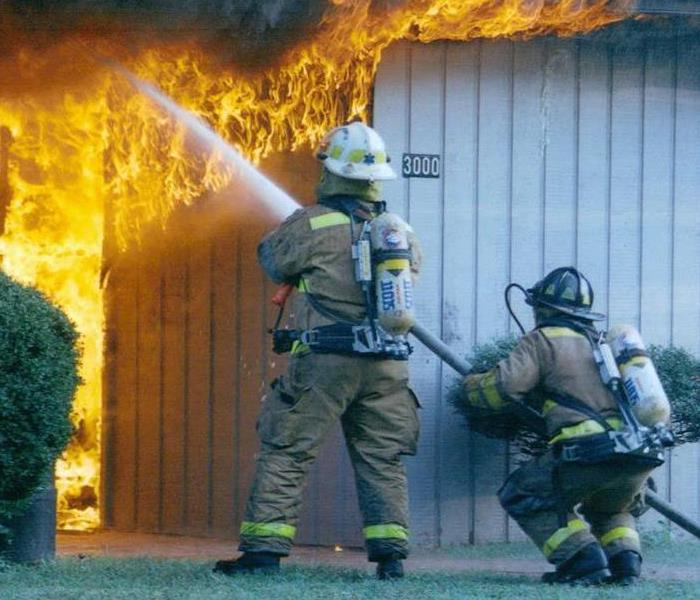 A Commercial building on fire in Edmund. This building will need board up services from SERVPRO of Edmund and Midwest City
A Commercial building on fire in Edmund. This building will need board up services from SERVPRO of Edmund and Midwest City
It can be difficult to determine where to begin cleaning up after a fire. When you have experienced a fire disaster in Edmund, one of the first steps to consider is boarding up your commercial building. Dealing with fire damage is devastating enough without the threat of added problems like looting. Therefore, it is important to request help from SERVPRO® of Edmund and Midwest City. Our professionals can ensure that your commercial building stays protected. Board-up services are designed to safeguard your property and belongings from other forces at work, whether human or environmental, and there are many benefits to acquiring these services for your commercial property.
Boarding up your commercial property helps prevent thieves and vandals from entering. Unfortunately, there are many people who try to profit off a disaster. Seeing an easy opening into a building through broken windows or doors is simply an invitation for these individuals. Boarding up any entrances while your property is vacant will help keep looters away until repairs completed.
Boarding up your commercial property guards against the weather causing more damage. If open areas of your building are hit by a rainstorm or intense winds, you will be forced to contend with more than just fire damage. Covering these openings with plywood helps to eliminate any chance of additional damage. Preventing additional damage can save you money and time.
Insurance companies often require property owners to utilize board-up services. Following their advice can help you get greater coverage if the damage is proven to be solely from the fire. Your insurance carrier is not likely to pay for additional damage from outside forces. They could consider giving you less coverage overall for not following procedure.
Keep your commercial property in Edmond protected by using SERVPRO of Edmund and Midwest City to board up after a fire. Using SERVPRO will help prevent looting and additional damage to your property.
SERVPRO of Edmund and Midwest City should be your first choice for any residential or commercial fire damage. Our team of professionals is trained to assess the damage, identify potential threats, and respond quickly to restore your property to preloss condition. SERVPRO of Edmund is available 24/7 by calling
How Clean Your Dryer Vents in 3 Easy Steps
2/18/2024 (Permalink)
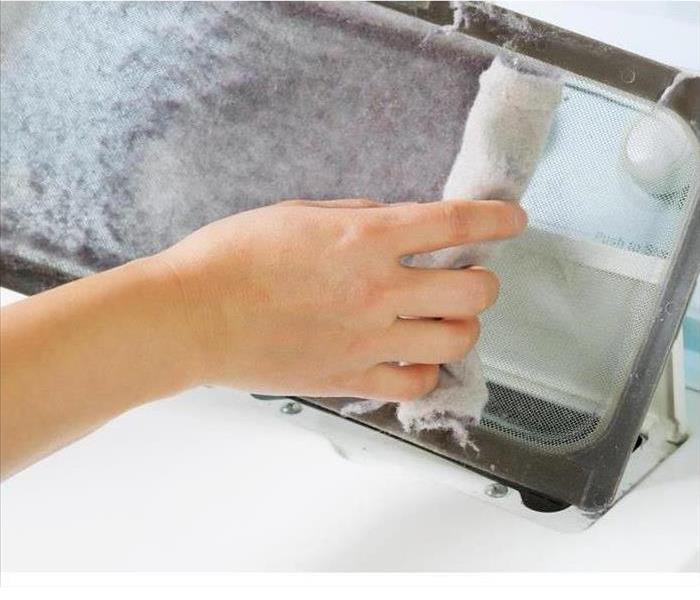 Unblocking the lint screen is the most important step towards preventing a dryer fire
Unblocking the lint screen is the most important step towards preventing a dryer fire
Basic Steps In Maintaining A Dryer
A well-maintained dryer offers many benefits to its owner. The heating elements last longer, clothes dry faster and you get to avoid a lint fire. It is also worth noting that dryer maintenance is a DIY level project that requires only a few minutes to complete.
Here are the basic steps to maintaining a dryer that every homeowner in Edmond, OK should know
Cleaning the Lint Screen
Doing a deep clean of the vents
Completing a deep clean of the interior
1. Cleaning the Lint Screen
Unblocking the lint screen is the most important step towards preventing a dryer fire. Grab the screen and pull it out until it’s fully extended or entirely removed. Then use soap and water to clean it until there’s no more blockage. While you’re at it, vacuum the empty lint trap to get rid of any debris before inserting the lint screen. This process should be repeated after every use to avoid fire damage.
2. Doing a Deep Clean of the Vents
First of all, disconnect the dryer from power then use a screwdriver to loosen the clamps that attach the vent to the exhaust. Use a cleaning brush to remove the lint balls in the pipe. Then snake the wall vent before reassembling the appliance.
3. Completing a Deep Clean of the Interior Dryer
Clean the dryer interior every six months to prevent nasty surprises. You’ll need to unplug the dryer then open the back panel so you can vacuum the interior. The idea is to rid of any dirt, lint, and debris that may affect the machine’s performance or cause a lint fire.
There’s nothing more painful than realizing you could have easily prevented a house fire. A lint fire is one of those situations that can be avoided by regular DIY maintenance. So, make dryer cleaning a habit and also share this info with friends and family.
Water Damage Restoration
1/3/2024 (Permalink)
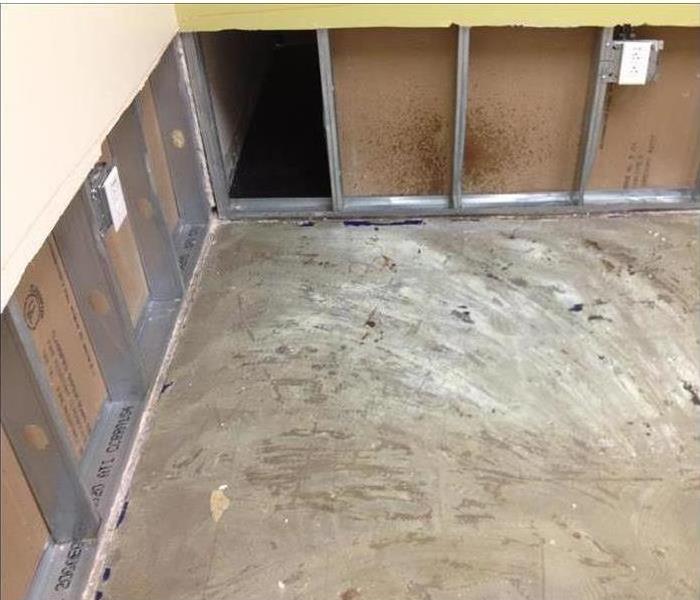 Water damage restoration in Arcadia
Water damage restoration in Arcadia
Water damage to your Arcadia, OK, home can be a major problem. Fortunately, acting quickly can help prevent further damage, including mold growth.
Causes
There are many ways water can damage your home. The following are some of the most common:
- Broken pipes
- Leaking roof
- Storm damage
- Malfunctioning appliances
Homeowner's insurance will cover most types of damage caused by water, but for damage caused by flooding you will need flood insurance. Before any damage occurs, talk to your insurance agent to make sure you have the right type of insurance and the right amount of coverage for your home and belongings.
Restoration Process
If your home suffers water damage, remember that mold can begin to grow within 24 hours. It is important to begin the water cleanup process as soon as possible. First, extract all standing water using a specialized pump or vacuum. If necessary, you can also use buckets to scoop out the water. After this step, there will still be water in porous items, such as carpeting and upholstery. Dry out the remaining water using fans and dehumidifiers. If the humidity outside is low, you can open windows and doors to increase air flow. Next, clean and sanitize all affected surfaces. The source of the water will determine the type of cleaner that you should use. Throw out everything that cannot be fully cleaned and dried. You may need to consult a professional to make this determination. Depending on the extent of the damage and amount of water present, the drying process can take days or weeks. Finally, repair and replace all damaged items. Some repairs you may be able to do yourself, but delicate items, such as antiques and electronics, may need professional restoration.
Cleaning up water damage can be a complex process. If you feel overwhelmed, a certified restoration company can help you get your home back to normal quickly and safely.
What To Do When a Toilet Overflows in Your Home
11/3/2023 (Permalink)
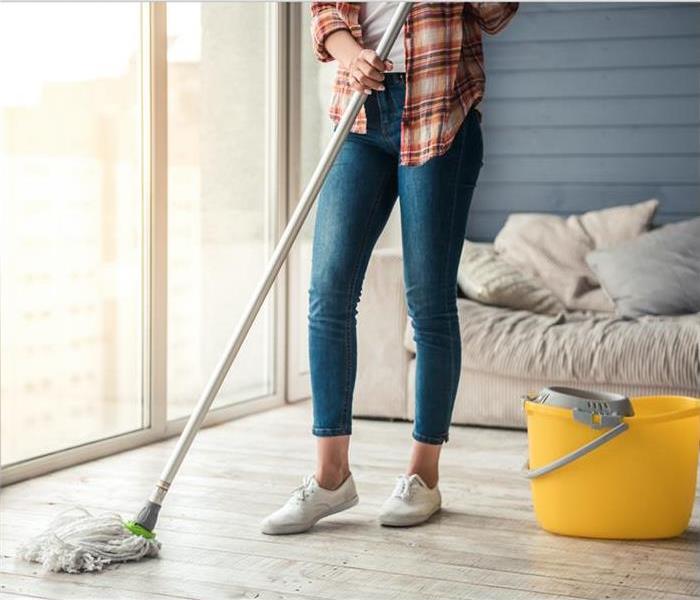 Remove the standing water by using mops
Remove the standing water by using mops
How to React To a Toilet Overflow
Toilet overflows are a common problem that affect many homes in Oklahoma City, throughout the year and often result in sewer damage. It can be useful to know how to react to a toilet overflow before one occurs in your home.
1. Turn Off and Remove the Water
To prevent water from spreading in your bathroom and to other areas of your home, it’s often wise to turn off the toilet’s water supply. Generally, the sooner you can turn off the water supply, the less damage that will occur. Once the water has been turned off, it’s normally best to remove any standing water by using mops or towels. Quickly removing water will make it easier to fix the issue with the toilet and can help to prevent mold growth.
2. Unclog the Toilet
After you have taken steps to prevent sewer damage by turning off the water and drying the floor and area surrounding your toilet, you can shift your focus to unclogging the toilet. You can normally fix a clogged toilet with a plunger, but if your plunger isn’t fixing the problem, you may want to consider using an auger. Generally, your toilet should work normally after it has been unclogged.
3. Know When To Call In Professionals
If you are unable to unclog your toilet on your own, if your flooded toilet has caused major water damage or if your toilet commonly overflows, it may be necessary to contact a sewage company that can help to fix the issue. Additionally, it can be helpful to contact local water restoration specialists if you suspect that major damage has occurred or if there has been standing water in your home for several days.
Knowing how to react to common problems in the home, such as toilet overflows, is useful for every homeowner. Turning off and removing water, unclogging the toilet if you are able and calling professionals when necessary can help you manage the issue and prevent sewer damage.
How To Prevent Water Damage During Construction
10/6/2023 (Permalink)
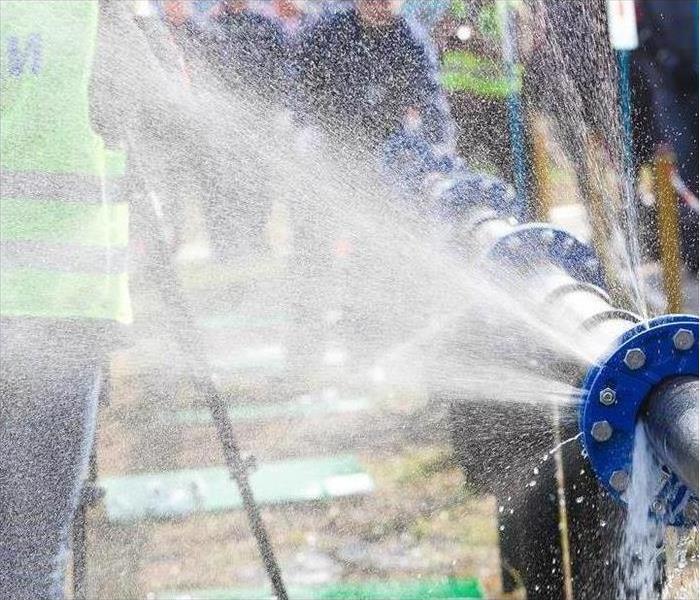 The contractor has a responsibility to discuss building system details and inspection concerns with the client.
The contractor has a responsibility to discuss building system details and inspection concerns with the client.
Water damage can cause delays and damage on a construction site. Contractors should calculate water damage risks and perform testing at every stage of the building process. A broken pipe requiring water pipe repair or other sources of water damage can necessitate delays or rework and prove a major source of loss. It is important to take preventative measures from the planning to the finishing stages.
Before Construction Begins
Contractors should start by developing a quality assurance and control program and evaluate contract documents for the following factors:
• Backup power and pumping systems for dewatering
• Critical waterproofing systems
• Drainage plans to protect excavations or structure
• Water infiltration susceptibility
Water can penetrate through the building envelope and undermine the integrity of the structure being built. Internal releases are another common source of damage as construction proceeds. The sooner hydronic and piping systems are installed, the less likely they will be to cause damage to finished work.
During the Construction Process
A quality director and water protection team should monitor and address any problems that arise, from water pipe repair to a flooded excavation. A contractor may rely on an internal team or external subcontractors to provide the following services:
• Hydrostatically test fire protection systems and check for leakage
• Perform air pressurization testing of piping systems prior to charging with water
• Charge piping systems by zone without all valves open
• Monitor piping for at least 24 hours after charging
• Perform water-tightness testing on roof
• Complete the structure before installing finishes
The contractor has a responsibility to discuss building system details and inspection concerns with the client. They should also address all issues, including water pipe repair, in a timely manner and not allow problems to persist. This can save time and money on delays and rework. Contact a commercial restoration company located in Edmond, OK, if a finished project sustains water damage. For more information, visit http://www.SERVPROedmond.com/!
Third-Party Certification for Cleaning and Restoration Professionals
8/24/2023 (Permalink)
 SERVPRO is certified with the IICRC for water, fire, and mold damage.
SERVPRO is certified with the IICRC for water, fire, and mold damage.
Third-Party Certification For Cleaning And Restoration Professionals
The Institute of Inspection, Cleaning and Restoration Certification is an independent third-party certification agency for the restoration industry. The IICRC reviews the certification processes and the standards put in place for cleaning and restoration professionals Hibsaw, OK. Companies and manufacturers in many industries work closely with third-party certification agencies for several reasons:
- Non-biased certification shows compliance with national or international standards.
- Third-party compliance shows a company's commitment to safety and quality.
- A mitigation certificate from a third-party increases credibility with customers, insurance companies, and regulators.
- Restoration companies benefit from enhanced regulations in quality and safety.
- Companies, auditors, and consumers enjoy increased trust and cooperation.
Increased Trust Between Service Providers and Consumers
While some government oversight plays a role in protecting consumers from fraud and low-quality goods or services, third-party certification takes a stronger stance. This is good for restoration companies and for consumers because it develops relationships of deeper trust between the service provider and the customer. Naturally, company leaders promote the quality and benefits of their own goods or services. When customers hear those claims and expect a high level of service, only to be disappointed, their trust in the company suffers.
Higher Levels of Quality and Stricter Standards
Agencies that oversee and enforce quality standards, such as IICRC, perform a series of checks and audits to ensure that companies are in compliance. Agencies may affect how often cleaning and restoration technicians are trained and could influence what is taught during trainings. As a result, customers don't have to take the word of marketers or company spokespersons; instead they look for certification from neutral parties.
Benefits for Service Providers and Customers
Third-party certification through agencies such as IICRC encourage higher quality standards and improved consumer confidence. There may be limitations to governmental oversight and industry regulations, but the involvement of an outside agency fills existing gaps. Cleaning and restoration companies offer certification and compliance verification to service partners and consumers. Customers enjoy the increased standards for quality and safety. It's a situation where all parties benefit.
3 Awesome Alternatives to Candles
8/22/2023 (Permalink)
 You do not need to sacrifice your favorite scent or aesthetic for safety when you choose candle alternatives for your home in Luther, OK.
You do not need to sacrifice your favorite scent or aesthetic for safety when you choose candle alternatives for your home in Luther, OK.
The power of a scent is indisputable, some aromas relax you while others transport you to another time and place. As you light a scented candle at your home in Luther, OK, you wonder if the benefits of a lit candle outweigh the fire hazards it poses. Candle fires are a common cause of fire damage in homes, especially around the holidays when candles are commonplace. When homeowners leave candles unattended or in close proximity to towels, curtains or other fabrics the risk of fire increases further. Consider these three candle alternatives to safely enjoy a fragrant home all year round.
1. Battery Operated
There are a wide variety of flameless candles powered by batteries. Some appear physically identical to candles, which is an excellent choice if you enjoy the visual appeal of candlelight. Others use scented wax to provide the olfactory sensation you desire. For an original look, there are battery-powered bases with scented decorative shades as well.
2. Warmers
Continue to enjoy candles without lighting the wicks by using a candle warmer. A lamp light over the candle melts the wax and disperses the scent through your home. Other candle alternatives include oil warmers, which releases fragrances through a battery or electrical source heating scented oil. Wax warmers are similar, by which a heated foundation melts scented wax.
3. Diffusers
Another flameless option is to diffuse a scent, such as by placing reeds in a base of aromatic oil. There are also many choices of battery or electrical water diffusers to use with any essential oil you desire.
You do not need to sacrifice your favorite scent or aesthetic for safety when you choose candle alternatives for your home in Luther, OK. If you do use a candle, never leave it unattended or place it too close to flammable materials. Should a candle fire occur, immediately leave the house and call 911. Contact a fire restoration specialist and your homeowner’s insurance company to begin the process of restoring your home. For more information, visit http://www.SERVPROedmond.com/.
How To Be Proactive About Plumbing Issues
8/18/2023 (Permalink)
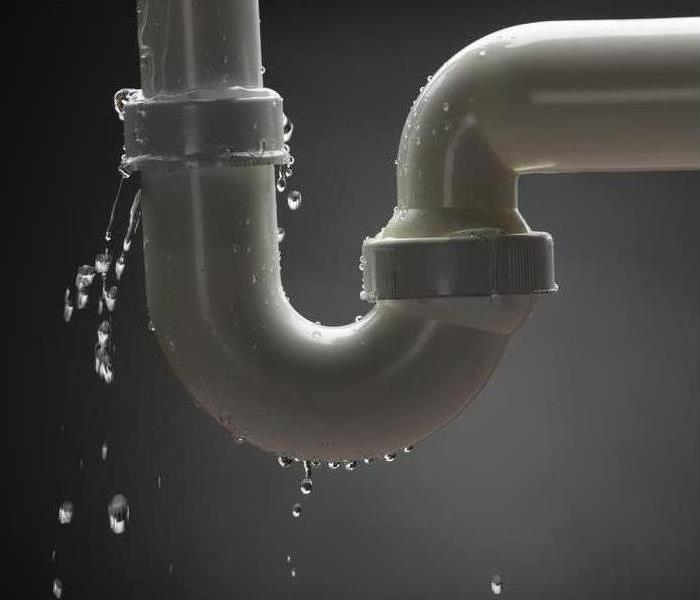 Contact your plumber right away and you may save yourself from needing a water damage mitigation specialist in Edmond, OK.
Contact your plumber right away and you may save yourself from needing a water damage mitigation specialist in Edmond, OK.
When plumbing problems happen, they can seem as unpredictable as a lightning strike. Maybe this is why so many business owners wait until there’s a broken pipe before taking action. The problem with this approach is that many plumbing issues can result in water damage and hiring a water damage mitigation specialist in Edmond, OK, is an added expense you want to avoid. You can prevent many plumbing repairs by being proactive. Follow these steps to keep your building’s plumbing healthy.
1. Find a Good Plumber First
Too many people wait until there’s a problem and then frantically search for any available plumber to come and fix it. Don’t wait for a problem. Ask around, read online reviews and test out a few different commercial plumbers to find one you trust. It helps to choose a plumber who has experience with your type of business, whether it’s a restaurant or apartment building. Once you have a good plumber, you’ll know exactly who to call when plumbing problems come up.
2. Schedule Regular Maintenance Visits
Most people don’t even know they can schedule regular maintenance visits with their plumber. During a maintenance visit, an experienced plumber can assess your entire building and let you know the state of your plumbing. Many leaks occur because pipes are old or made of poor-quality materials. If your plumber notices your supply lines are made from rigid plastic, he or she might recommend upgrading to braided steel. The expense of an upgrade could actually save you a great deal of money by preventing leaks and water damage.
3. Monitor Your Water Bill
Many plumbing problems can be invisible until the damage becomes extensive. A leak in the water main, broken pipes in the wall or a silently running toilet can cost thousands of dollars over time. In addition to regular maintenance, which can catch many of these issues, it’s a good idea to monitor your water bill. If you notice you’re paying more than usual, it could be due to a hidden leak. Contact your plumber right away and you may save yourself from needing a water damage mitigation specialist in Edmond, OK. For more information, visit http://www.SERVPROedmond.com/.
When To Do Maintenance on Your Furnace
7/26/2023 (Permalink)
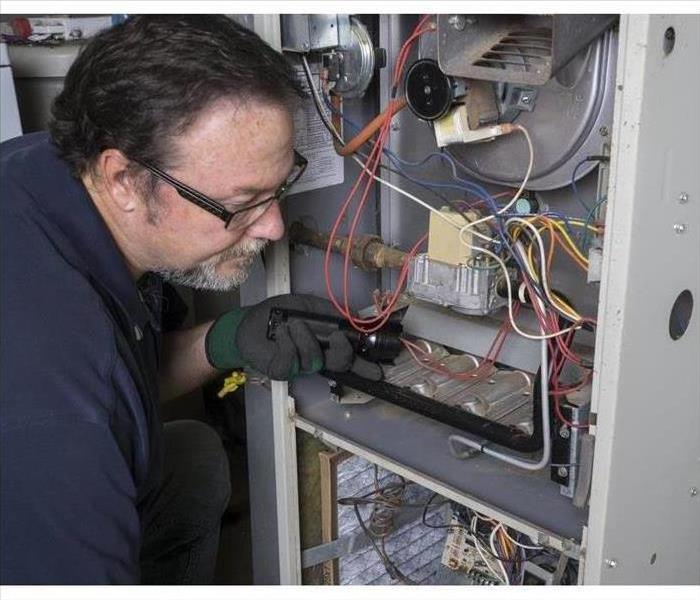 Furnace repair
Furnace repair
Preventative fire cleaning on your home furnace in Arcadia, OK, is important to ensure it functions correctly and doesn’t cause fire damage. While many people suggest hiring a maintenance professional to inspect annually, there are some things you can do yourself as well to ensure you system runs efficiently.
Replace Filters Regularly
Dirt can be a big problem for heating and cooling systems, by lowering efficiency and burning extra fuel. Keep the system clean by vacuuming around the unit regularly and changing the filter monthly or whatever time-frame is recommended by the manufacturer.
Leaving old filters to sit for too long will add stress to the compressor and can eventually result in mechanical failures. Not only that, the dirt and debris will get recirculated through your home which can cause allergies and disease. It’s also important to do additional fire cleaning on heaters, radiators, and warm-air registers, while also ensuring they’re not blocked.
Maintenance Before Cold Weather
Many homeowners call a professional to do a yearly inspection and fire cleaning on their furnace before the heating season to confirm the system is clean and performing in the most efficient way possible. Here are a few steps you can take yourself to keep your bills low while staying warm:
Calibrate the thermostat. The correct calibration can be lost from excess dirt or being moved around. A furnace maintenance professional can check this annually, or you can replace it with a computerized one.
Clean and adjust the burners to improve efficiency, and check for any rust accumulation.
Reverse ceiling fans to a clockwise rotation to help push warm air down, especially if you have tall ceilings.
Seal any air leaks and all air ducts, especially in the attic or crawl spaces. Metal tape and insulation can temporarily save an aging duct system.
It’s good to get into the habit of allowing a professional to service your furnace once per year. Waiting until the end of the heating season (the off-season) may give you faster service at a slight discount. If you have endured some home damage due to a furnace issue, smoke cleaning and remediation services are available that can usually clean up the mess to almost as good as new.



 24/7 Emergency Service
24/7 Emergency Service









